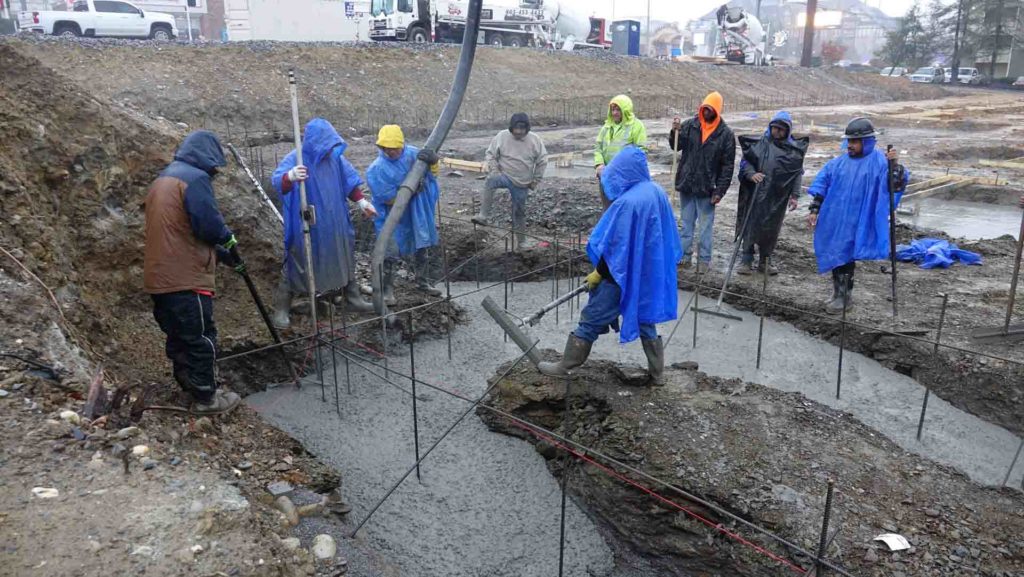Rain-Rain Go Away, We are pouring Concrete Today!
At Sensible Concrete Works, we pride ourselves on delivering durable and high-quality concrete for both your home and business. But even with the best planning, Mother Nature can sometimes throw a curveball in the form of rain right after a fresh concrete pour. So, what happens when those raindrops start falling? And more importantly, what should you, as a homeowner or business owner, know?
We’re here to shed some light on this crucial topic and offer sensible advice to protect your investment.
The Critical Early Hours: Why Rain Can Be a Problem
Imagine a freshly poured concrete slab it’s still in its delicate initial setting phase. If rain arrives too soon, before this hardening process has properly begun (typically within the first few hours), it can have a significant impact:
- Washing Away the Good Stuff: The surface of wet concrete contains a vital cement paste, the very binder that holds everything together and creates a strong, smooth finish. Heavy rain can literally wash this paste away, leaving behind a weaker, more porous surface.
- Exposing the Aggregate: You might start seeing the larger stones in the concrete mix becoming visible and loose, as the binding paste is eroded.
- Creating an Uneven Mess: Each raindrop can create an indentation, leading to a rough, pockmarked surface instead of the smooth finish you expect.
- Diluting Strength: Excess water from heavy rain can increase the water-cement ratio at the surface, weakening the crucial top layer of your concrete.
Once It Starts to Set: Less Risky, But Still a Concern
As the concrete begins to stiffen (usually after 4-8 hours), it becomes more resilient to rain. However, even then, a significant downpour isn’t ideal:
- Surface Imperfections: Raindrops can still leave their mark, creating an uneven texture.
- Loss of Fines: Some of the finer cement particles can still be washed away, potentially affecting surface durability.
- Surface Weakness: Increased water at the surface can still lead to a weaker top layer.
The Silver Lining: When Rain Can Actually Help
Interestingly, once the concrete has hardened (typically after 24 hours), a gentle rain can actually be beneficial! It acts as a natural curing agent, keeping the concrete moist which is essential for the hydration process – the chemical reaction that makes concrete strong.
Sensible Steps to Take if Rain is on the Horizon (or Arrives Unexpectedly):
As the property owner, being aware and proactive can save you headaches down the line. Here’s what Sensible Concrete Works advises:
- Stay Informed: Keep an eye on the weather forecast, especially on pour days. If significant rain is predicted, discuss postponement options with your concrete contractor.
- Be Prepared: If rain is a possibility, ensure your contractor has protective measures in place, such as plastic sheeting or tarps, readily available to cover the fresh concrete quickly.
- Act Fast: If rain begins unexpectedly during or shortly after the pour, prompt action is crucial. Covering the concrete as thoroughly as possible is the best immediate defense.
- Avoid DIY “Fixes”: Resist the urge to sprinkle dry cement on a wet surface. This can actually weaken the concrete.
- Communicate with Your Contractor: If rain does impact your new concrete, contact Sensible Concrete Works. We can assess the situation and advise on the best course of action, whether it’s monitoring, allowing natural curing, or implementing necessary repairs.
Trust the Sensible Approach:
At Sensible Concrete Works, we understand the delicate nature of fresh concrete and the potential impact of rain. We take weather forecasts seriously and are always prepared to take necessary precautions to protect your investment. Our experienced team will guide you through the process and ensure that your concrete project, rain or shine, is built to last.
Have questions about your upcoming concrete project? Contact Sensible Concrete Works today for a consultation and let us bring our expertise and sensible solutions to your doorstep!




